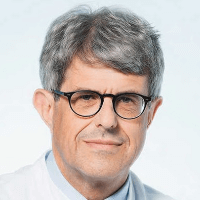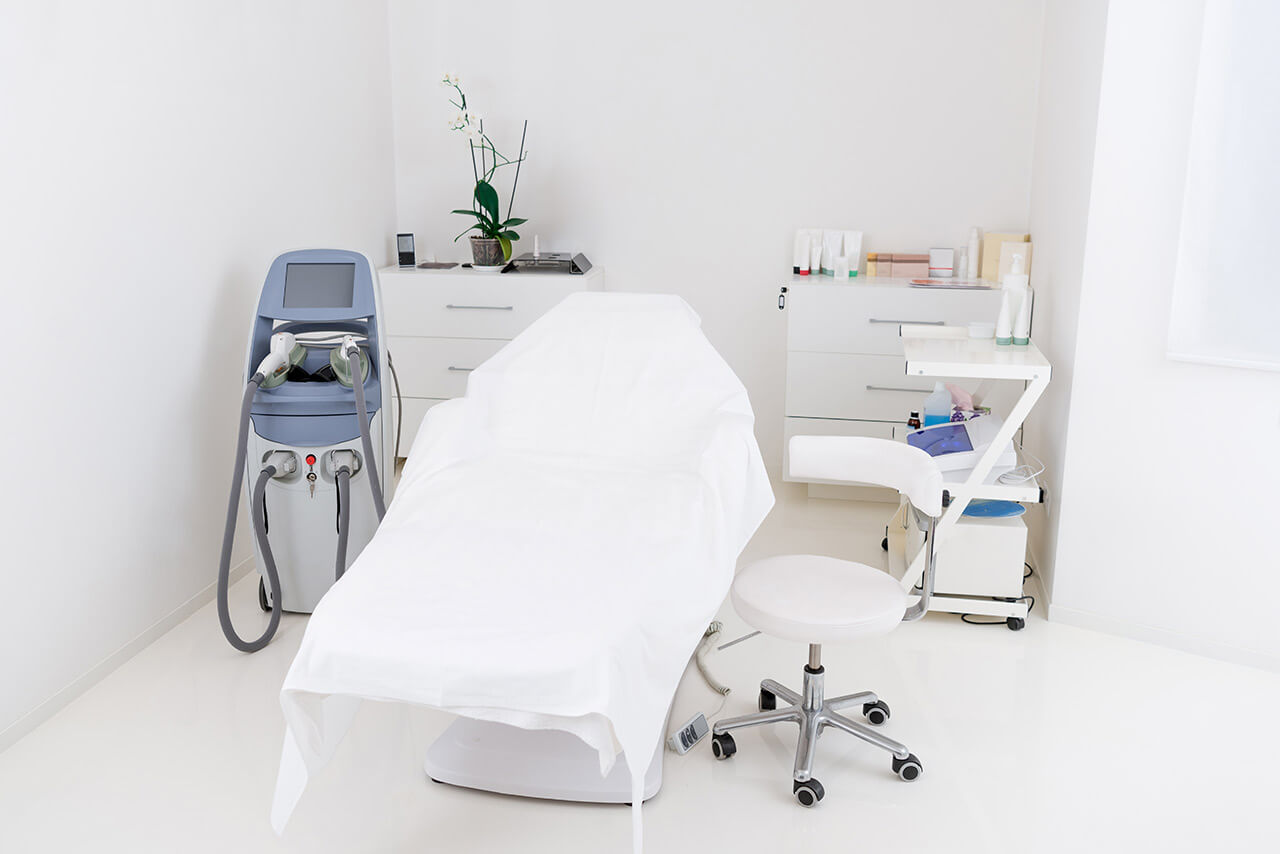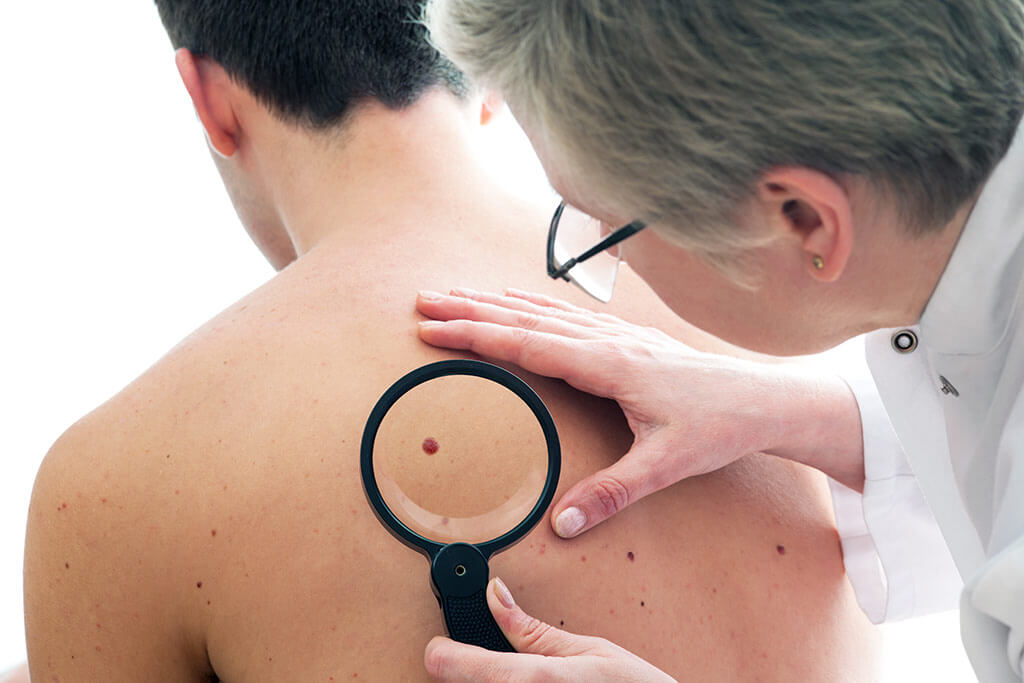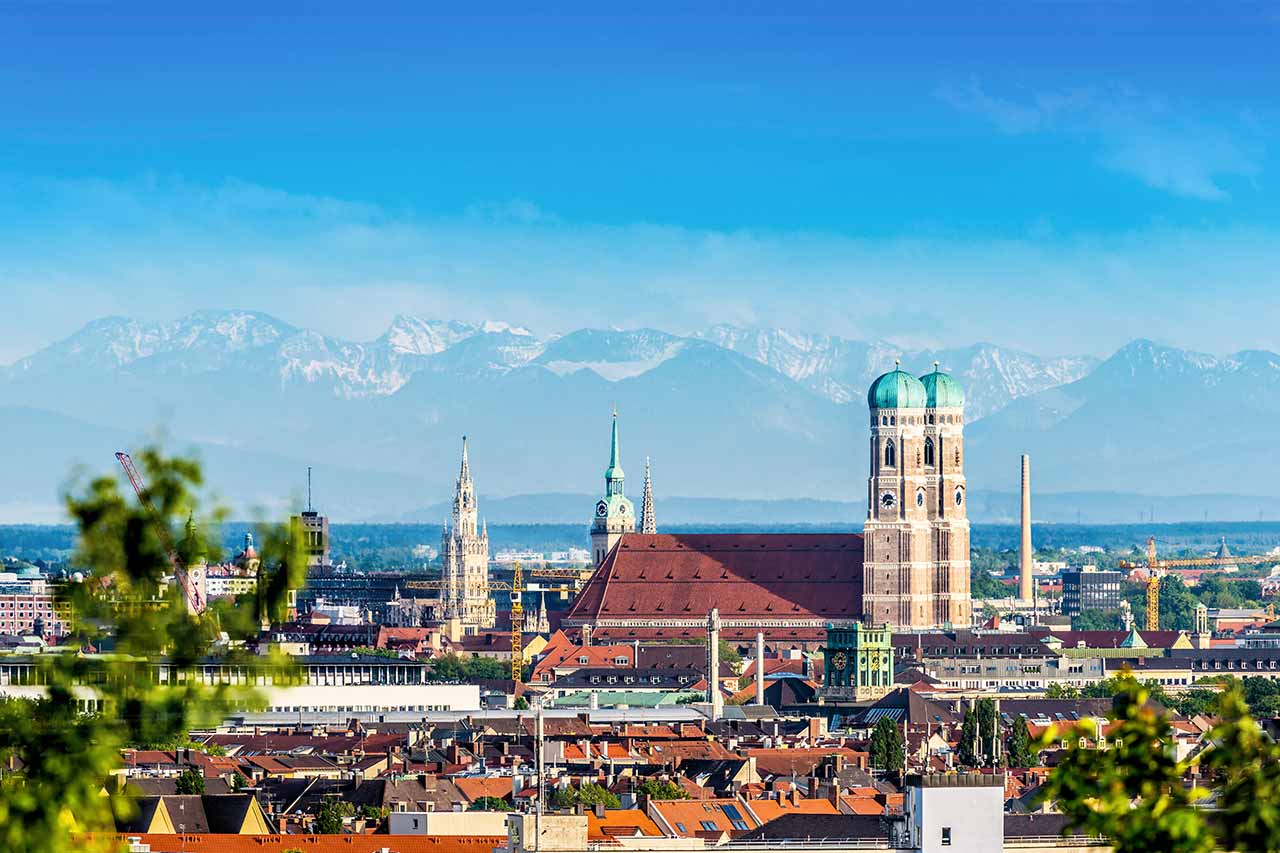
The program includes:
- Initial presentation in the clinic
- clinical history taking
- physical examination
- review of medical records
- laboratory tests:
- complete blood count
- general urine analysis
- biochemical analysis of blood
- TSH-basal, fT3, fT4
- tumor markers
- indicators of inflammation (CRP, ESR)
- indicators blood coagulation
- ultrasound
- CT/MRI scan
- preoperative care
- micrographic surgical treatment of facial skin melanoma
- histologically and immunohistochemically
examination of the remote tissues - symptomatic treatment
- control examinations
- the cost of essential medicines and materials
- nursing services
- full hospital accommodation
- explanation of future recommendations
Required documents
- Medical records
- Biopsy results (if available)
Service
You may also book:
 BookingHealth Price from:
BookingHealth Price from:
About the department
The Department of Dermatology and Allergology at the Hospital Thalkirchner Strasse Munich offers all the options of modern medicine for the accurate diagnostics and effective treatment of diseases of the skin and its appendages, as well as skin manifestations of allergic reactions. The key clinical focus is on the treatment of all types of skin cancer, inflammatory skin diseases, allergies and chronic non-healing wounds. State-of-the-art diagnostic equipment and in-house laboratories of the medical facility guarantee accurate diagnostics and, accordingly, the choice of the optimal treatment regimen. The department's doctors specialize in both conservative and surgical treatment. The innovative types of laser therapy, phototherapy, PUVA therapy and other effective treatment methods are widely used in clinical practice. The department's dermatologists annually treat more than 11,000 patients, including foreign ones, which testifies to the reputability of the medical facility in the international medical arena. The Chief Physician of the department is Prof. Dr. med. Wilhelm Stolz.
When admitted to the department, the attending physician carefully studies the patient's medical history and appoints the necessary diagnostic tests. After receiving the diagnostic results, the department's specialists hold a comprehensive consultation, during which they elaborate an individual treatment regimen, taking into account the wishes of the patient. In many cases, drug therapy with pills, ointments and creams is sufficient to eliminate a skin pathology. The state-of-art laser systems are also often used in clinical practice, including a CO2 laser, a neodymium Nd:YAG laser and others. Laser therapy is mostly used for acne scar revision, removal of hemangiomas, age spots, warts, moles, spider veins, etc. In addition, laser treatments are effective for some types of skin cancer, but only at the early stages. The main advantages of laser therapy include minimal invasiveness of the procedure, absence of complications and speedy recovery upon completion of treatment.
The department's medical team has unique experience in the treatment of skin cancer, which today is a common type of oncology. The incidence rates of skin cancer is the same in both men and women. As a rule, pathology develops in open skin areas, which facilitates diagnostics. With early diagnostics and effective treatment, the disease has a favorable outcome. The most dangerous type of skin cancer is melanoma. If skin cancer is suspected, the patient will be appointed a set of diagnostic tests, which may include MRI, CT, ultrasound, digital dermoscopy, biopsy and laboratory tests. It should be noted that the head of the department, Prof. Wilhelm Stolz, took part in the development of one of the most effective dermatological tests – dermatoscopy. The specialist also worked at the creation of computer-assisted video dermoscopy, which is an improved technique of this examination. A great advantage for patients is the presence of in-house Dermatohistology Laboratory, so all the required skin sample testing can be performed in the department within 24 hours. The main treatment for skin cancer is surgery, which includes the use of a laser, radio waves, classical surgical resection, microscopically-guided surgery, etc. After the intervention, the patient can be prescribed immunotherapy, chemotherapy, radiation therapy, targeted therapy, as well as preventive measures in order to eliminate recurrence in the future. Whenever required, plastic reconstructive interventions and skin grafting can also be performed.
The treatment of inflammatory skin diseases is also one of the priority focuses of the department's dermatologists. In this field, the treatment of neurodermatitis and psoriasis is of particular interest. The patients with severe types of chronic inflammatory skin diseases are prescribed local therapy with ointments and creams in combination with light therapy on an inpatient basis, under close medical supervision. The course of treatment is often complemented by the intake of immunomodulatory drugs, which affect the functioning of the immune system and alleviate symptoms.
In addition, the department provides effective treatment for allergic reactions. Of particular interest is the treatment of insect venom allergies, food allergies, drug allergies, and allergic reactions to various external factors. During the treatment, the department's doctors carry out tests for specific antibodies, provocative tests, prick tests and other examinations. The main treatment option is immunotherapy, which can be complemented by symptomatic drug therapy. All the procedures are carried out under the close monitoring of specialists, which ensures the optimal treatment result.
The department specializes in the diagnostics and treatment of the following skin diseases:
- Diagnostics and treatment of various skin cancers
- Melanoma
- Squamous and basal cell carcinoma
- Fungal mycosis and other skin lymphomas
- Merkel cell carcinoma
- Dermatofibrosarcoma
- Angiosarcomas and other rare skin tumors
- Skin tumors caused by chronic immunodeficiencies
- Diagnostics and treatment of benign skin neoplasms
- Papillomas
- Birthmarks
- Warts
- Keratomas
- Xanthelasma
- Hemangiomas
- Fibroids
- Diagnostics and treatment of inflammatory skin diseases
- Neurodermatitis
- Psoriasis
- Autoimmune bullous dermatoses
- Hives
- Lichen planus
- Collagenosis (systemic scleroderma and systemic lupus erythematosus)
- Diagnostics and treatment of age-related skin changes in elderly patients
- Desiccant eczema
- Bullous pemphigoid
- Chronic non-healing wounds (for example, leg ulcers, non-healing wounds caused by diabetic foot syndrome, bedsores, etc.)
- Diagnostics and treatment of allergic skin manifestations
- Drug allergy
- Atopic dermatitis
- Food allergy
- Insect venom allergy
- Allergic contact dermatitis
- Diagnostics and treatment of occupational skin diseases
- Diagnostics and treatment of chronic non-healing wounds
- Venous, arterial and neurotrophic ulcers of the lower limbs
- Pyoderma gangraenosum
- Chronic non-healing wounds in diabetes mellitus
- Other skin diseases
The department's therapeutic options include:
- Drug therapy using pills
- Local therapy with ointments and creams
- Laser therapy (CO2 laser, Nd:YAG neodymium laser and others)
- Phototherapy
- PUVA therapy
- Skin cancer therapy
- Surgical resection of malignant tumors, including microscopically-guided surgery, reconstructive plastic surgery and skin grafting
- Immunotherapy
- Antibody therapy
- Chemotherapy
- Radiation therapy (in cooperation with the specialized department)
- Laser therapy and IPL therapy for certain types of skin cancer
- Treatment of chronic non-healing wounds using modern dressings and vacuum therapy
- Other therapeutic options
Curriculum vitae
Dr. med. Wilhelm Stolz is the Head of the Department of Dermatology and Allergology at the Hospital Thalkirchner Strasse Munich. The specialist underwent clinical training in the Department of Adult and Pediatric Dermatology at the University Hospital of Ludwig Maximilian University of Munich. In 1990, Dr. Stolz became Senior Physician in the Department of Adult and Pediatric Dermatology at the University Hospital of Ludwig Maximilian University of Munich. From 1992 to 2002, he held the position of Professor and Senior Physician with management responsibilities in the Department of Dermatology at the University Hospital Regensburg. In 2002, the specialist became Head of the Department of Dermatology and Allergology at the Hospital Schwabing.
Dr. Wilhelm Stolz enjoys a reputation as Germany's leading dermatologist and has successful experience in the treatment of various skin conditions. He has a particular clinical interest in the diagnostics and treatment of skin cancer.
Prof. Stolz together with Gregor Morfill, Director of the Max Planck Institute for Extraterrestrial Physics in Garching, developed a special computerized digital system for the analysis of pigmented moles, which in 1998 was marked with the Innovation Award Bavaria (European patent PCT/ EP1998/008020).
Photo of the doctor: (c) München Klinik gGmbH
About hospital
The Hospital Thalkirchner Strasse Munich is a progressive highly specialized medical center, which provides the full range of modern preventive, diagnostic and therapeutic procedures for the restoration of skin health. For many years, the medical facility has been rightfully considered the largest Dermatology Hospital in Europe. The hospital was built in 1929, and some time later this type of building became a model for other medical complexes. Despite the fact that the clinic was designed many decades ago, nowadays it strikes with a modern look both outside and inside, as it is constantly being modernized. Since 1929, the hospital has been cooperating closely with the Department of Adult and Pediatric Dermatology, Allergology at the University Hospital of Ludwig Maximilian University of Munich, which ranks among the best medical facilities in Germany. The cooperation of dermatologists from both hospitals promotes an active exchange of clinical experience and the use of the very latest therapeutic methods for the benefit of the patients suffering from skin diseases.
The hospital has 160 beds for inpatients and 40 beds for patients undergoing treatment in a day hospital. No other Dermatology Hospital in the European Union has such a number of beds. The medical team of the hospital annually diagnoses and treats more than 11,000 patients both with simple skin diseases and with especially complex pathological skin lesions, which require a highly professional approach of competent doctors with long clinical experience.
Of particular interest to the hospital's dermatologists is the treatment of all types of skin cancer, inflammatory skin diseases, skin allergic reactions, chronic non-healing wounds and skin diseases in the elderly. The advanced medical equipment of the hospital allows the doctors to carry out extended instrumental and laboratory diagnostics, the results of which serve to establish an accurate diagnosis and determine the effectiveness of further treatment. The therapeutic options of the medical complex are very diverse. It offers all the latest achievements in the field of dermatology – innovative drugs, laser therapy, photodynamic therapy, state-of-the-art operating rooms for surgical treatment and other options.
The medical facility has a strict quality control system, which allows the doctor to monitor all medical processes, compliance with hygiene and safety standards. In addition, the medical staff of the hospital cares about the comfort of their patients during treatment.
Photo: (с) depositphotos
Accommodation in hospital
Patients rooms
The patients of the Hospital Thalkirchner Strasse Munich live in cozy rooms with everything necessary for a comfortable stay. The hospital offers single, double, triple and quadruple patient rooms. Single and double rooms are designed for patients wishing to take advantage of the enhanced-comfort living conditions. All patient rooms have a bathroom with shower and toilet. In addition, each patient room includes a TV and a telephone. The telephone can be used with a special telephone card. All patient rooms have automatically adjustable beds and a special nurse call system. The patient rooms of the hospital are equipped in accordance with modern requirements for medical facilities in Germany.
The medical center has an in-house library with a large assortment of paper books and audiobooks, DVDs, music CDs and magazines, a post office and a mini-supermarket.
Meals and Menus
The patients of the hospital are offered tasty and healthy three meals a day. All meals are cooked from the freshest ingredients available in the region. Breakfast is served buffet style – bread, buns, cheeses, sausages, yoghurts, fruits, tea, coffee, etc. The patient can choose from three different menus for lunch and dinner. If you are on a specific diet for some reason, you will be offered an individual menu. Please inform the nursing staff about your food preferences prior to treatment.
Further details
Standard rooms include:
Religion
The religious services are available upon request.
Accompanying person
During the inpatient program, the accompanying person can live with the patient in a patient room or a hotel of his choice. Our managers will help you choose the most suitable option.
Hotel
During the outpatient program, the patient can stay at the hotel of his choice. Our managers will help you choose the most suitable option.




